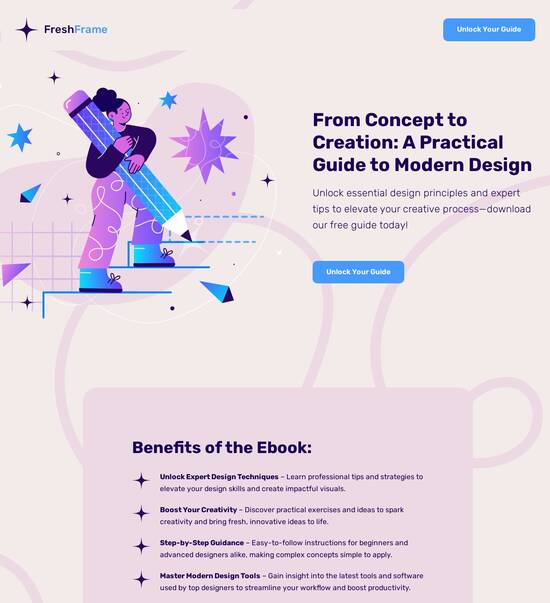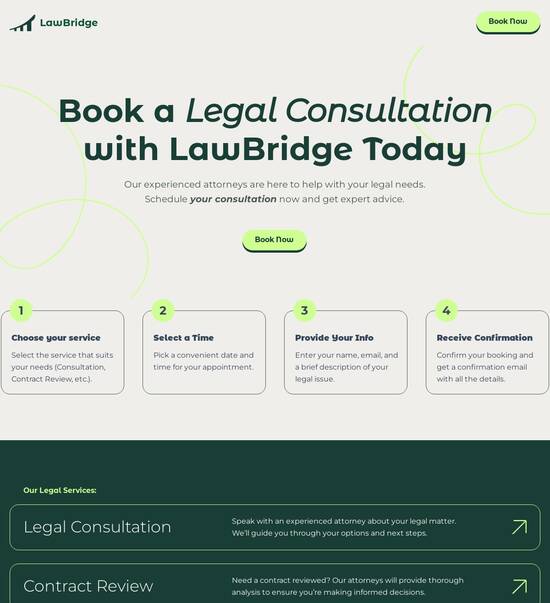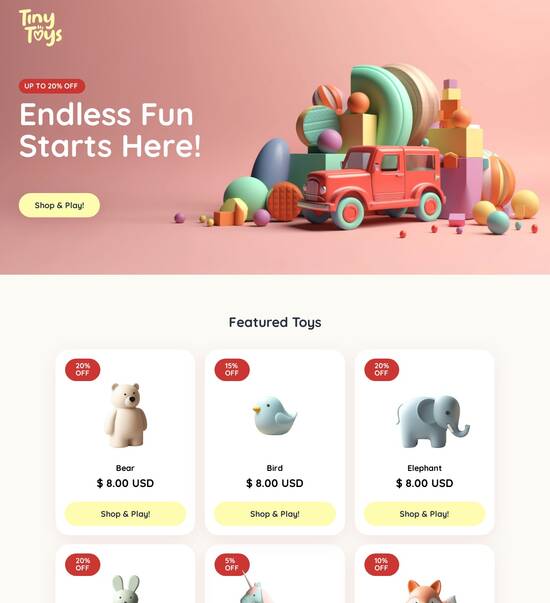
Website template for Hotel managers
Explore Similar TemplatesAbout template
Achieve your online goals with the website template for Hotel managers.
Recommended templates

Easy to build without coding
With the intuitive drag-and-drop builder, anyone on your team can create high-converting pages without any knowledge of code or design. Make enhancements to your landing page with custom widgets using Javascript, HTML/CSS, or third-party scripts.

Multiple layouts for any industry and goal
Select from 500+ landing page layouts built to boost conversions across industry-specific scenarios. Customize them by adjusting fonts, adding images, and generating on-brand content with the AI assistant. Quickly scale with Instablocks® and Global Blocks that you can save, reuse, and update globally.

Loads fast and looks polished on any device
Every template is responsive, which means they present professionally on any device and load blazingly fast with our Thor Render Engine. You can also power them up with Google AMP technology to deliver an unparalleled mobile experience and drive higher conversions.

Robust analytics & experimentation
Get real-time updates and reporting across all your devices, showing the number of visitors, conversions, cost-per-visitor, and cost-per-lead. Launch AI-powered experiments, run A/B tests, and use heatmaps to analyze user behavior, then optimize your landing page to maximize conversions.







Easy to build without coding
With the intuitive drag-and-drop builder, anyone on your team can create high-converting pages without any knowledge of code or design. Make enhancements to your landing page with custom widgets using Javascript, HTML/CSS, or third-party scripts.
Multiple layouts for any industry and goal
Select from 500+ landing page layouts built to boost conversions across industry-specific scenarios. Customize them by adjusting fonts, adding images, and generating on-brand content with the AI assistant. Quickly scale with Instablocks® and Global Blocks that you can save, reuse, and update globally.
Loads fast and looks polished on any device
Every template is responsive, which means they present professionally on any device and load blazingly fast with our Thor Render Engine.
Robust analytics & experimentation
Get real-time updates and reporting across all your devices, showing the number of visitors, conversions, cost-per-visitor, and cost-per-lead. Launch AI-powered experiments, run A/B tests, and use heatmaps to analyze user behavior, then optimize your landing page to maximize conversions.
All the features you need to build lead-generating landing pages
Explore more featuresLearn how to build top-performing landing pages for any goal
FAQs
Leading the way in building high-performing landing pages





Maximize Your Marketing Impact with Instapage Landing Pages
Instapage offers a robust and dynamic platform designed to elevate your marketing campaigns through powerful landing pages optimized for conversion. The ability to quickly create and customize landing pages ensures that your business services, education initiatives, or SaaS offerings are effectively showcased to your target audience in the USA.
Understanding Instapage's Unique Features
Instapage stands out in the crowded market of landing page solutions due to its comprehensive features tailored for marketers. With over 100 high-converting templates and lead generation elements, you can leverage intuitive tools to swiftly launch effective campaigns without the need for coding skills. These advantages make it an ideal choice for industries such as financial services, government, and education.
- Templates: Choose from a wide array of customizable templates designed for optimal performance, catering to various industries and customer needs.
- Lead Generation: Utilize integrated lead capture forms and CTAs that drive conversions and enhance lead quality.
- Analytics: Access in-depth analytical insights to track engagement and funnel performance, helping you refine strategies based on real-time data.
Step 1: Choose the Right Template
Begin your journey by selecting a template that resonates with your campaign goals. Instapage offers an array of customizable templates that ensure simplicity and efficiency.
Step 2: Customize Your Landing Page
Once you’ve selected a template, personalization is key. Here are some customization tips:
- Dynamic Text Replacement: Tailor content dynamically based on user information to maximize relevance.
- Visual Brand Alignment: Ensure colors, fonts, and images reflect your brand identity to build trust and recognition.
- A/B Testing: Use built-in testing tools to experiment with different variations of your landing pages to boost conversion rates.
Step 3: Optimize and Analyze for Success
After launching your landing page, optimization is crucial for ongoing success. Take advantage of analytics tools to evaluate performance.
- Heatmaps: Utilize heatmap tracking to comprehend how users interact with your landing page.
- Conversion Rate Optimization: Iterate based on performance data to enhance user experience and increase conversions.
- Real-time Feedback: Gather insights from collaboration tools that allow input from team members for ongoing enhancements.
Remember, an effective landing page is not just about aesthetics; it's about achieving tangible results. Focus on continuous improvement and alignment with your marketing objectives.
Start transforming your marketing strategy today with Instapage. Sign up now and unlock your potential with high-performance landing pages tailored to your audience.
People also ask about Website template for Hotel managers
Website templates for hotel managers: A comprehensive guide
Understanding the landscape of hotel management: The role of website templates
In recent years, the hospitality industry has undergone a significant transformation, primarily due to the increasing reliance on digital platforms. Hotel managers are finding that their online presence is instrumental in attracting and retaining guests. As the market continues to evolve, the relationship between hotels and their digital presence has become paramount, necessitating the use of effective website templates designed to meet their specific needs.
The rise of online bookings has further fueled the need for strong, aesthetically pleasing websites. Hotels must not only provide information about their services but also create an engaging user experience that translates to direct bookings. A well-structured website serves as a digital storefront, showcasing various offerings while streamlining the booking process.
Hotels must cultivate a robust online presence to remain competitive in a saturated market.
A website acts as a primary channel for guest interaction and booking.
Effective marketing strategies hinge on having a user-friendly and informative website.
However, hotel managers face several challenges in this digital landscape. They must navigate a variety of distribution channels, each with its own set of standards and expectations. Travelers are also more discerning, influenced by fluctuating preferences and changing booking trends. Consequently, hotel managers need a flexible and adaptable website template that can cater to these dynamics.
Features of an innovative hotel website template
A successful hotel website template goes beyond mere aesthetics—it requires thoughtful features that enhance user experience. A user-friendly interface is essential in ensuring that guests can navigate the site with ease and find the information they need swiftly. This includes streamlined navigation across pages, which helps visitors to seamlessly transition from searching for rooms to completing their booking.
Mobile responsiveness also plays a vital role for modern travelers who frequently use their smartphones to browse and book hotels. An optimized mobile experience not only enhances accessibility but also boosts conversion rates by accommodating users who prefer on-the-go browsing.
Engaging hotel website designs should prioritize user-friendly layouts.
Mobile responsiveness is a critical feature for capturing various traveler preferences.
Fast loading times are essential to reduce bounce rates and keep potential guests engaged.
Rich multimedia integration is another key element. Hotels can effectively showcase their amenities and experience through high-quality images, engaging videos, and even virtual tours. Such features not only entice potential guests but also communicate the hotel’s unique identity and value proposition.
Customization options enable hotel managers to tailor templates according to their brand. Adapting color schemes, typography, and layout elements to reflect the hotel's identity is crucial for establishing a cohesive and memorable online presence.
Systematic booking management: Ensuring seamless transactions
A vital component of any hotel website template is its integration with online booking systems. Various booking engine solutions come equipped with robust API capabilities, allowing for real-time availability updates and dynamic pricing features. This responsiveness ensures that potential guests receive accurate information, enhancing their booking experience and encouraging them to proceed with their reservations.
Moreover, enhancing the customer experience with easy reservation systems is key to reducing cart abandonment rates. Simplified booking forms, designed to minimize the number of fields required to complete a reservation, facilitate a more efficient process. Hotels can even maximize profit by adding upsell options easily during the booking process, such as room upgrades, meal packages, and local tours.
Integrating with popular booking systems can optimize the reservation workflow.
Real-time updates on availability and pricing reduce potential booking conflicts.
Easy reservation forms minimize drop-off rates during the booking process.
In-depth functionalities of hotel website templates
The backbone of effective hotel management is a solid Content Management System (CMS) incorporated into the website template. A versatile CMS empowers hotel managers to execute timely updates regarding promotions, events, and offers without the need for extensive technical knowledge. This functionality not only saves time but also ensures that website content remains fresh and engaging.
Moreover, optimizing the website for search engines is critical for driving organic traffic. Implementing key SEO strategies tailored to hotel websites can significantly improve visibility in search results. Utilizing tools that facilitate keyword optimization, metadata adjustments, and backlink strategies can further enhance the hotel's online presence, attracting more visitors.
A robust CMS allows for quick updates and changes to content.
SEO features integrated into the template enhance online visibility, driving more traffic.
User-friendly interfaces within the CMS make content management straightforward for non-tech savvy users.
Leveraging distribution channels for maximum exposure
Understanding different distribution channels is essential for hotel managers to maximize their reach and occupancy rates. A strategic analysis of the various channels, including Online Travel Agencies (OTAs), direct bookings through the hotel’s website, and affiliate partnerships, can offer insights into customer preferences and behavior. Each channel presents unique advantages that hotels can leverage to increase visibility and capture bookings.
Direct bookings not only save costs associated with commission fees but also foster deeper relationships with guests. However, third-party platforms can also be beneficial for reaching a broader audience. A balanced approach, supported by effective channel management systems, ensures that hotels can optimize their marketing strategies.
Analyzing distribution channels helps in identifying the most effective platforms for outreach.
Combining direct bookings with third-party listings can maximize overall occupancy.
A channel management system enables efficient distribution and pricing strategies.
Building effective partnerships through integrations
In today’s increasingly digital hospitality environment, utilizing apps and integrations is essential for streamlining operations. Many hotel website templates allow for seamless connections with Customer Relationship Management (CRM) tools and email marketing applications, facilitating the management of guest relations and marketing campaigns. This connectivity supports the overall goal of enhancing guest experiences while improving operational efficiency.
Additionally, collaboration with technology providers can elevate the guest experience significantly. Integrating chatbots and AI solutions into hotel websites can enhance customer service by providing instant responses to inquiries, streamlining the booking process, and offering personalized recommendations.
Integrations with CRM systems enhance relationship management with guests.
Technology partnerships improve service efficiency and guest satisfaction.
Utilizing chatbots for customer service can streamline inquiries and bookings.
Designing for travelers: Creating a memorable online experience
Creating a memorable online experience is crucial for any hotel looking to attract and retain guests. Personalizing visitor experiences using data analytics allows hotels to adapt their websites according to traveler preferences. By incorporating location-based services, hotels can provide curated recommendations for local attractions and amenities, enhancing the overall experience for guests.
Interactive elements, such as forms, surveys, and event calendars, can create more dynamic engagements. By inviting user feedback and facilitating interactions, hotels can not only improve their services but also foster a sense of community and connection with their guests.
Tailoring website interactions based on traveler data increases engagement.
Implementing feedback mechanisms can enhance guest satisfaction.
Interactive elements create a sense of connection and involvement.
Analyzing performance: Monitoring success metrics
To gauge the effectiveness of their website, hotel managers must prioritize website analytics. Identifying key performance indicators (KPIs) specific to hotel websites, including traffic sources, bounce rates, and conversion rates, can provide invaluable insights. These metrics allow managers to understand how well their site performs in attracting and converting potential guests.
Tools for real-time analysis can streamline hotel management, enabling timely decisions based on current data trends. Furthermore, interpreting findings allows hoteliers to modify website elements—be it design, content, or functionality—to enhance results. Case studies have illustrated how certain hotels have successfully adapted their strategies based on performance analysis, ultimately leading to increased bookings and improved guest satisfaction.
Monitoring KPIs helps identify strengths and areas for improvement.
Real-time analytics enable informed decision-making for hotel managers.
Case studies provide insight into adaptive strategies that yield positive outcomes.
Future trends in hotel website templates
As technology continues to advance, hotel managers must stay ahead of potential trends impacting traveler behavior. Innovations on the horizon include the integration of virtual reality (VR) and augmented reality (AR) to offer immersive experiences for prospective guests. Such technologies could allow potential customers to explore rooms and facilities as if they were actually on-site, further bridging the gap between digital exploration and physical reality.
Moreover, the evolution of personalization in hotel marketing is gaining traction. Guests increasingly expect tailored experiences, and leveraging data to create individualized content and recommendations will be crucial for maintaining competitive advantage. Looking forward, hotels that invest in dynamic website content driven by AI will likely see enhanced user engagement and improved conversion rates.
Anticipate changes in technology that enhance user engagement, like VR and AR.
Personalization will become increasingly important for meeting customer expectations.
AI-driven content will shape the future of hotel website experiences.
Conclusion: Embracing change in hotel management
In summary, hotel managers must recognize the necessity of adapting to the digital transformation shaping the hospitality industry. Implementing comprehensive website design templates is a long-term strategy that can yield significant benefits. By creating a strong online presence, integrating advanced functionalities, and analyzing performance insights, hotels can successfully navigate the challenges of the current landscape and position themselves for future success.
Adapting to digital changes is essential for competing in today’s market.
Effective website templates enhance guest engagement and conversion rates.
Ongoing analysis and adaptation are key to long-term success in hotel management.
Ready to skyrocket conversions?
Supercharge your ad campaigns with high-performing landing pages
Get started














